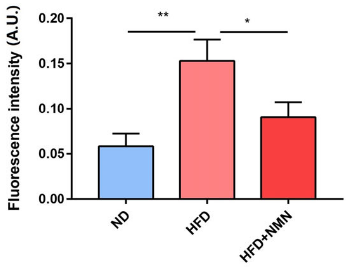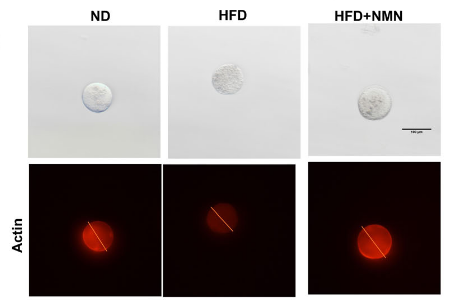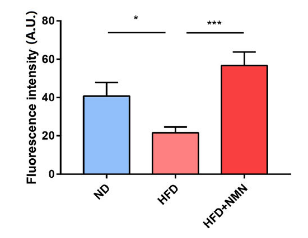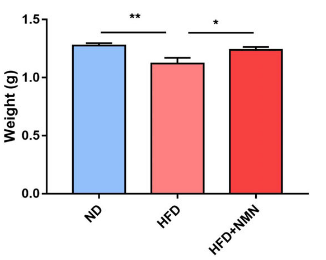Study Demonstrates NMN Can Improve Newborn Health
Treating obese female mice with nicotinamide mononucleotide (NMN) reduces DNA damage and improves structural protein composition within egg cells (oocytes) while restoring low offspring birth weight.
Highlights
- Obese females treated with NMN have oocytes with less DNA damage.
- NMN administration to obese females improves the structural architecture – actin proteins – of their oocytes, a key marker of oocyte quality.
- NMN restores the body weight of offspring produced by obese mothers, suggesting the reversal of metabolic defects.
With obesity becoming more widespread, higher numbers of overweight women are having difficulties with poor reproductive outcomes, such as early pregnancy failure and birth defects. Such difficulties stem from inflammation and poor oocyte quality. Even so, little has been done to find ways of restoring oocyte quality for obese women to improve their reproductive outcomes and their children’s quality of life.
Published in Cell Proliferation, Dai and colleagues from Jilin University in China show that treating obese mice with the nicotinamide adenine dinucleotide (NAD+) precursor NMN prevents DNA damage and enhances the structural quality of oocytes. The China-based team goes on to show that the low body weights of the offspring produced by obese mothers can be restored by NMN. These findings suggest that obese females may utilize NMN to improve their oocyte quality and enhance their reproductive health.
NMN Improves Oocyte Quality and Restores Offspring Body Weight
Although oocytes possess DNA damage repair mechanisms, more DNA damage can increase the chances of genetic defects and developmental abnormalities in the offspring. Dai and colleagues examined DNA damage in oocytes from obese females and found that their oocytes possess over twice the damaged DNA compared to females fed a normal diet. After treating the obese females with NMN, the levels of DNA damage were cut in half, indicating that NMN preserves DNA integrity and oocyte quality in obese females.



The integrity of the cell’s protein skeleton – actin protein filaments – is another key indicator of oocyte quality and viability. Dai and colleagues found that oocytes from obese female mice have about half the actin protein in their outer membranes than mice fed a normal diet. Intriguingly, oocytes from obese mothers treated with NMN have even more actin proteins in their outer membranes than healthy females. These findings provide further evidence that treating obese females with NMN improves the quality of their oocytes.


The China-based researchers next examined the effects of NMN treatment on the offspring of obese females. The researchers found no differences in fertility or number of offspring between healthy and obese females, or obese females treated with NMN. However, Dai and colleagues did observe that the offspring of obese mothers had reduced body weights, which NMN treatment restored. Since low body weight is indicative of metabolic abnormalities, these findings suggest that NMN can improve offspring body weight by mitigating these abnormalities.

Could NMN Improve the General Health of Offspring?
Most studies on NMN and female reproduction have pertained to fertility, showing that NMN improves fertility during aging, not focusing on oocyte quality. This is the first study to show that NMN can enhance oocyte quality in obese females. While the study did not examine fertility directly, it did show reduced DNA damage, increased structural integrity (actin), and restored body weight in offspring. Damaged DNA and poor cell structure integrity, indicators of poor oocyte quality, may predispose mothers to early pregnancies and birth defects after fertilization. The findings from this study point to NMN supplementation as possibly promoting healthier offspring from obese females.
Model: Female C57BL/6J mice
Dosage: 200 mg/kg/day intraperitoneal injections for 10 days

